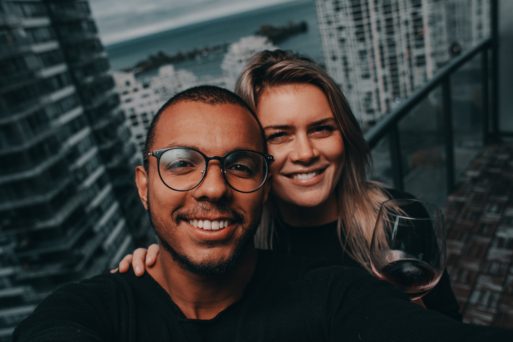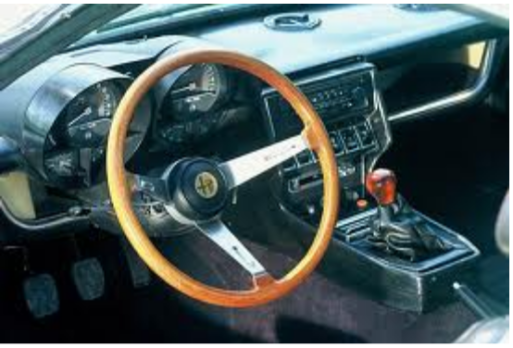
Diane and I were happy in the beginning, but it was destined not to last.
This is an anonymous story, as told by Irena Kaci. Our “Opening Our Hearts” stories are based on people’s real-life experiences with loss. By sharing these experiences publicly, we hope to help our readers feel less alone in their experience of grief and, ultimately, to aid them in their healing processes. In this article, we tell the story of a man who lost his girlfriend, Diane, to suicide.
Diane and I had barely been dating for three months. It was early days in the relationship and we had every reason to keep it casual. For one thing, we were both getting out of serious relationships, and it was for both of us our first interracial relationship. I know it sounds outdated to say it these days, but this was the 1980s. Race relations were very fraught, and interracial relationships were still kind of a novelty.
Diane’s life up until the point where our paths crossed had been very different than my own. I don’t know that I fully appreciated that fact. She had been married and divorced twice, both times to millionaires. She was used to a very comfortable lifestyle and had never actually worked for money before. In fact, all of her work was volunteer work. She volunteered with the Junior League. I didn’t even know what that was at that time. She had to explain it to me that she was helping combat child abuse and trafficking. I remember thinking that was kind of an impressive pursuit. That was the side of her that made me feel like we could connect.
“One day she told me she was sure her ex-husband had once rigged her oxygen tank to run out of air during a dive.”
During her last marriage, she had spent her time sailing around in a private yacht and scuba diving all over the world. Yet in all these stories of opulence and adventure, there was always some dark streak that would throw me for a loop. One day she told me she was sure her ex-husband had once rigged her oxygen tank to run out of air during a dive. Thankfully, she had made it back up in time. It was actually her reason for divorcing him — the fact that she felt like he was trying to kill her. It was something I didn’t quite know how to process, so I mostly just accepted that story at face value. Much later, I would realize that this was another sign of her emotional instability.
“When I went back inside, Diane was in the bathroom throwing up.”

Diane in one of her many luxury hotel rooms during her second marriage. I remember loving this picture of her.
There were more signs, of course, but all kind of isolated from one another, easy to explain away in the moment. One example: One day, my doorbell rang. Diane was there, so as I walked over to open the door, she peeked around from behind me. At the door was an ex-girlfriend of mine with whom I was on pretty good terms. Upon realizing that Diane was right behind me, I excused myself and shut the door for a moment of privacy. I told my ex that it wasn’t a good time to connect, though it had been a pleasant surprise, and went back inside. I was gone all of two minutes. When I went back inside, Diane was in the bathroom throwing up. When she came back out, she accused me of not loving her. I tried my best to reassure her, but the fact was that we had only been seeing each other for a little while, and love didn’t quite enter into it yet for me.

Diane and I posing on my balcony before the fateful day she tried to kill herself.
The next time Diane was at my place, she made an attempt on her life. She swallowed almost a full bottle of pills from my medicine cabinet. It happened, to my mind, out of nowhere. Nothing negative or concerning had happened on that day. I genuinely thought we were having a nice time. She gave no warning, which made it that much more disturbing. I immediately rushed her to the hospital, where they pumped her stomach. As she was being cared for, I thought long and hard about our relationship and decided that this was the last straw. Diane had started to scare me, and this incident sealed the fate of the relationship as far as I was concerned.
“I pulled the car over and ran to give her mouth-to-mouth.”
Later, when I picked her up and drove her home, I decided to end things between us. While driving, I told her my feelings as kindly as I could. I honestly knew she would be upset, but there was some part of me that expected her to process the news the way a more stable person might. I expected her to understand that her issues were putting far too much pressure on a new and very casual relationship. I said “I think we should stop seeing each other.” At this point, I was nearing the end of a street to turn right. My car, an Alfa Romeo, was in first gear going slowly when Diane suddenly kicked the door handle open with her foot and shouted, “Have a nice life!” and then jumped out of the car.

The dashboard of the car I was driving that day.
She died on impact. I didn’t really understand that at first, so I pulled the car over and ran to give her mouth-to-mouth. When nothing happened, I ran to a nearby house knocking on the door to call the authorities. I was reacting appropriately, yet on the inside I was in complete shock. I simply couldn’t process the gravity of the matter in that moment. Despite how nervous she made me, I never wanted her to get hurt.
The next day, her roommate Donald called me. Donald was a very rich southerner and had always been a condescending smart-ass toward me, but this time he was tender and comforting. He told me “you probably feel guilty about it,” something that I hadn’t quite come to terms with myself. He went on to assure me that it was not my fault. It was easy to trust his take because he had known Diane well and for a long time. He explained that Diane had probably not meant to kill herself, but simply to manipulate me back into the relationship. I had often felt like a pawn in her games, and this fit with everything I’d perceived as well. Talking to Donald crystallized, for me, some of the ways in which Diane had often been unpredictable and volatile. That conversation really unlocked my ability to process this story with words.
“Considering that this was the early 80s and I was a black man dating a white woman, things could’ve gone very differently for me.”
Her mother tried to sue me after Diane’s death, claiming that I was responsible for her fragility. Luckily, I happened to be working for a law office that represented the local police, and they were able to keep the whole incident out of the papers. And even more luckily, Ian, old ex-boyfriend of Diane’s, was able to come forward and testify in my defense that Diane’s instability long preceded our relationship. It really helped that the ex-boyfriend in question was white. Considering that this was the early 80s and I was a black man dating a white woman, things could’ve gone very differently for me. I am very grateful that I had that job at the time, and that the authorities were willing to let me have some privacy around this.
My best friend Paul in San Diego called me right after her death and sent me a ticket to fly down and spend two weeks with him. “I don’t think you should be alone right now,” he said. Boy was he right! Going to stay with Paul was key to my slow road back to normalcy. I don’t think I could’ve been around my own neighborhood right after it happened. For years, I could not handle being anywhere near that corner.
“I felt guilty for a long time.”
I didn’t know her very well or for very long, so how was I to know the reactions she was having were out of the ordinary? Afterwards, there were all these “how comes?” How come she did it? How come she did it to me? How come I did not see it coming? I felt guilty for a long time.

My Alfa Romeo, the day I sold it.
It’s easier, in retrospect, to understand that she was feeling frustrated with things in her life. She had to work for the first time after a life of luxury. I think she was very selfish. When you do something like that you’re selfish. She hurt her mother, her sister and her whole family. They all suffered. When your life gets hard, you should reach out to the people you care about. I really feel for her family and how shocking and upsetting the whole thing was to them as well.
“There is goodness to be had, in the long run, even from the saddest moments.”
In an Indiana Jones movie the main character’s father says: “In life the older you get the more life takes from you and the less it gives you,” and that really stayed with me. It has been so many years since this happened, and I am finally able to talk about it in a way that I can handle. The shock has finally worn off. I am no longer in my 20s, and I understand that people die, sometimes suddenly. While this was not my preferred way to learn this lesson, it was certainly effective. I still think of Diane from time to time — her story helped form me into who I am. And it helped me realize that here is goodness to be found, in the long run, even from the saddest moments.

 My Close Encounter with Suicide
My Close Encounter with Suicide



 How Dare You Die Now!
How Dare You Die Now!
 Debating Medical Aid in Dying
Debating Medical Aid in Dying















